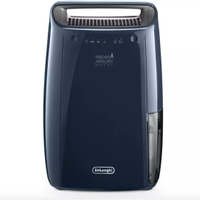I tested the De'Longhi AriaDry dehumidifier and loved its style and all-round performance
It's a top pick if you want a quiet, powerful and stylish machine that's exceptional at drying laundry
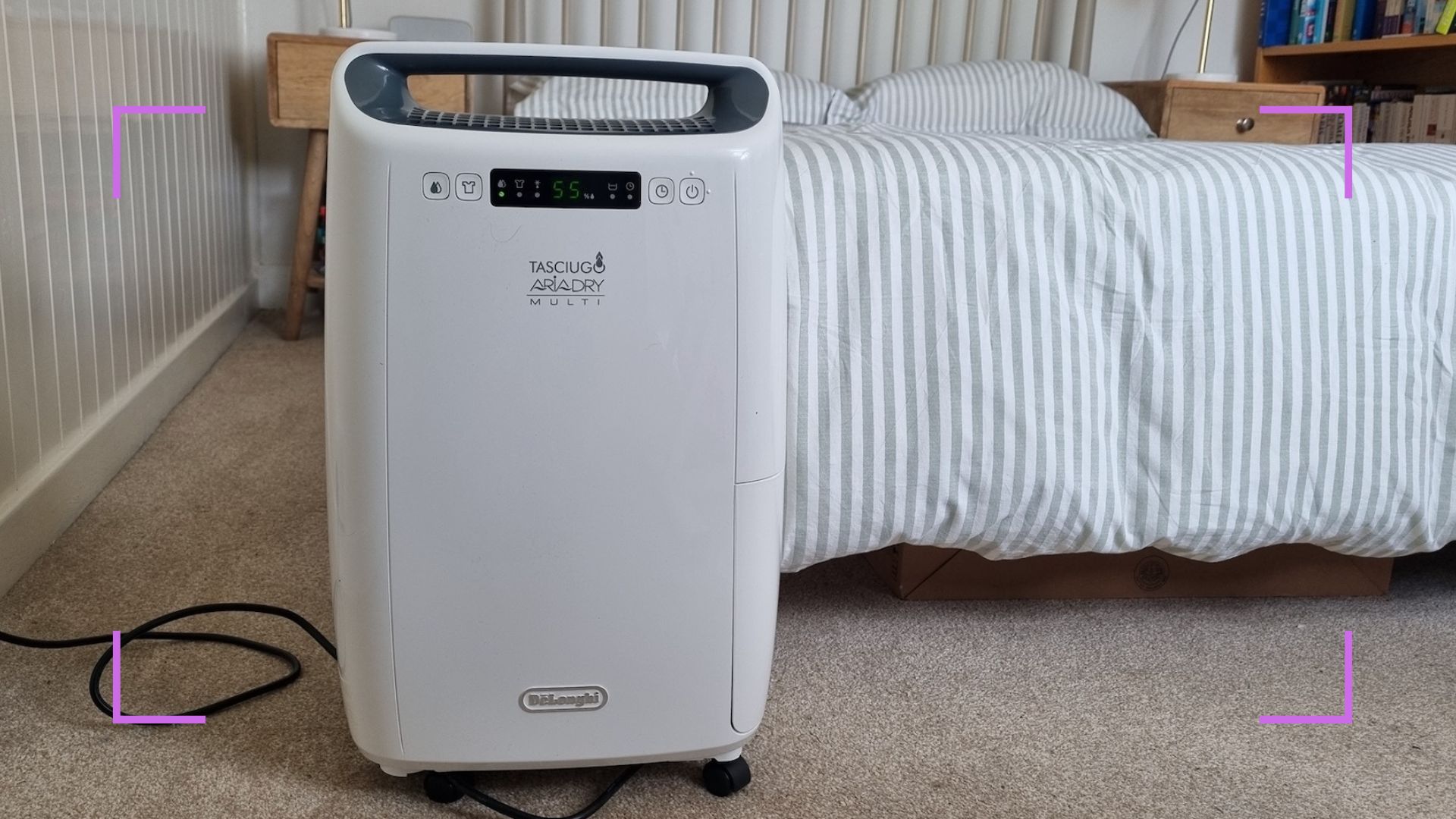
The De'Longhi Tasciugo AriaDry DEDX216RF dehumidifier is my favourite compressor dehumidifier of those I've tested. There is so much to love – it's quiet, does an amazing job of removing moisture, especially from laundry, and is a doddle to use. It outdoes its rivals thanks to its quiet operation, easy-to-empty water tank and the fact it's easy to move about, despite its size.
-
+
Aamzing at drying clothes
-
+
Water tank is easy to empty
-
+
Quiet, even in a bedroom
-
+
Simple controls are easy to use
-
+
Easy to carry and manoeuvre
-
-
Pricey, and not the cheapest to run
-
-
Power cable is short
-
-
Water tank could be bigger
-
-
No timer
Why you can trust Woman & Home

A dehumidifier is one of those appliances that you don't truly appreciate until you've owned one. But if you're tired of the sight of condensation dripping down your windows, or of waiting days for washing to dry indoors while the rain won't let up outside, you should.
The best dehumidifiers have the power to draw all excess moisture from the air – moisture that would otherwise provide the perfect conditions for mould and damp to form on walls, curtains, woodwork and upholstery. This damp won't simply look unsightly – it can cause physical damage to your property and even become a health risk in the long run, triggering conditions like asthma. That makes a dehumidifier a worthy investment, especially if you can grab one of our best dehumidifier deals.
I've put several dehumidifiers to the test for the Woman & Home team, including models for Meaco and EcoAir. And while they've all impressed me for different reasons, this DeLonghi model is my ultimate pick. Here's why...
DeLonghi Tasciugo AriaDry Multi 16L compressor dehumidifier
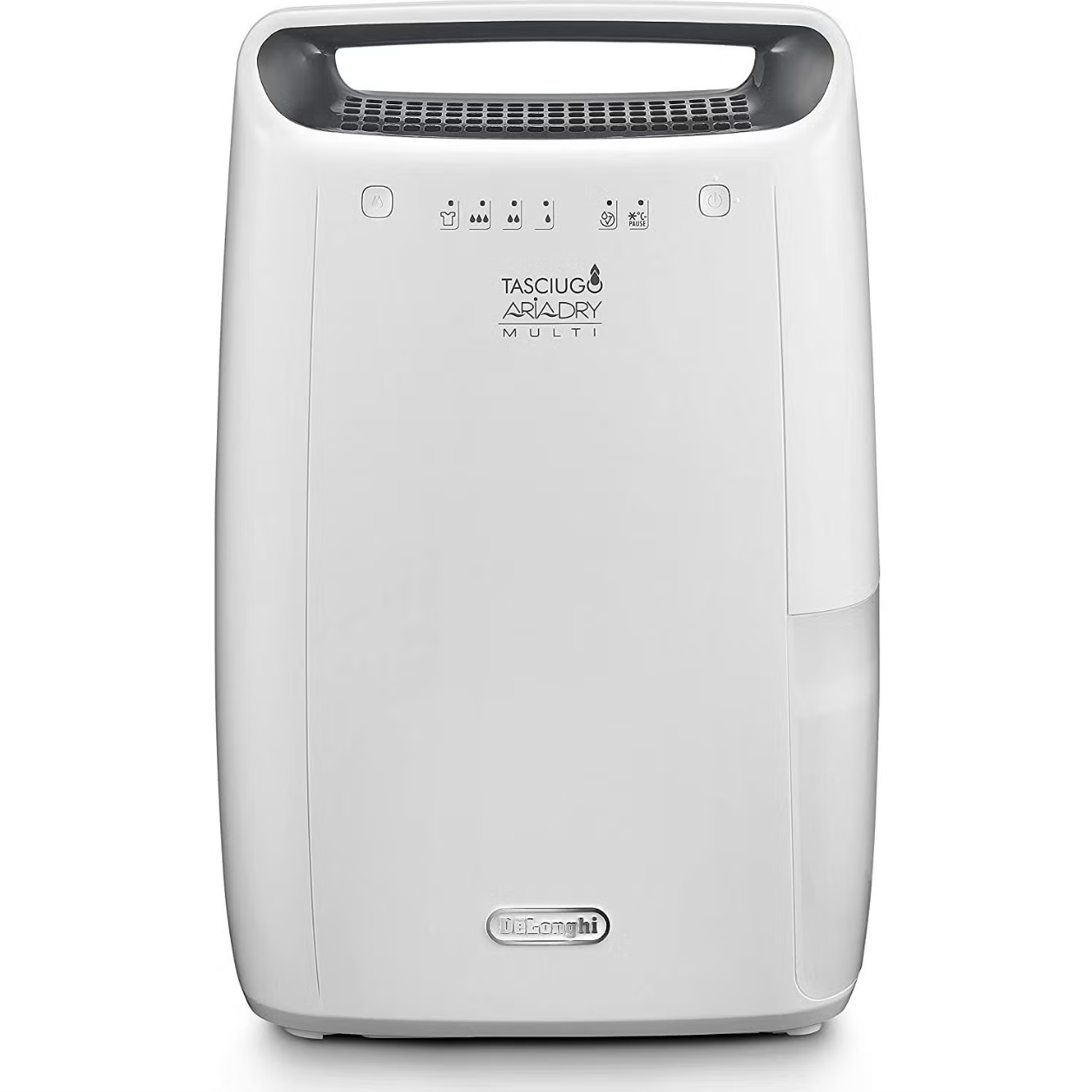
- RRP: £349.99
- Tank capacity: 2.1 litres
- Maximum extraction potential: 16 litres per day
- Size: 33.4 cm x 22 cm x 50.8 cm
- Weight: 9.5kg
My poorly insulated Victorian home is plagued with issues that a dehumidifier can help with, which is why I'd never be without one. Issues like mould that has a habit of forming on my living room and bedroom walls, and condensation that's particularly bad in my downstairs bathroom and living room. I also don't own a tumble dryer or one of the best heated clothes airers, preferring to rely on a dehumidifier's laundry mode to fast-track the drying of clothes and bedding.
First impressions
As I was unboxing this appliance, it definitely struck me as one of the most stylish dehumidifiers I've ever tried. Even in the white colourway (I personally think the navy is more beautiful), I was impressed by its sleek curves and clear but not overly complicated display.
The first thing I really loved was its built in handle. Handles on other models I'd tried (notably the EcoAir) felt awkward to grip and off balance, but this top-mounted handle is extremely well designed and made it easy to carry the dehumidifier up and downstairs. Despite being bigger than the EcoAir, it also weighs in at the same 9.5kg. We're not fat-shaming here – but it does show that the De'Longhi is a good weight for the power.
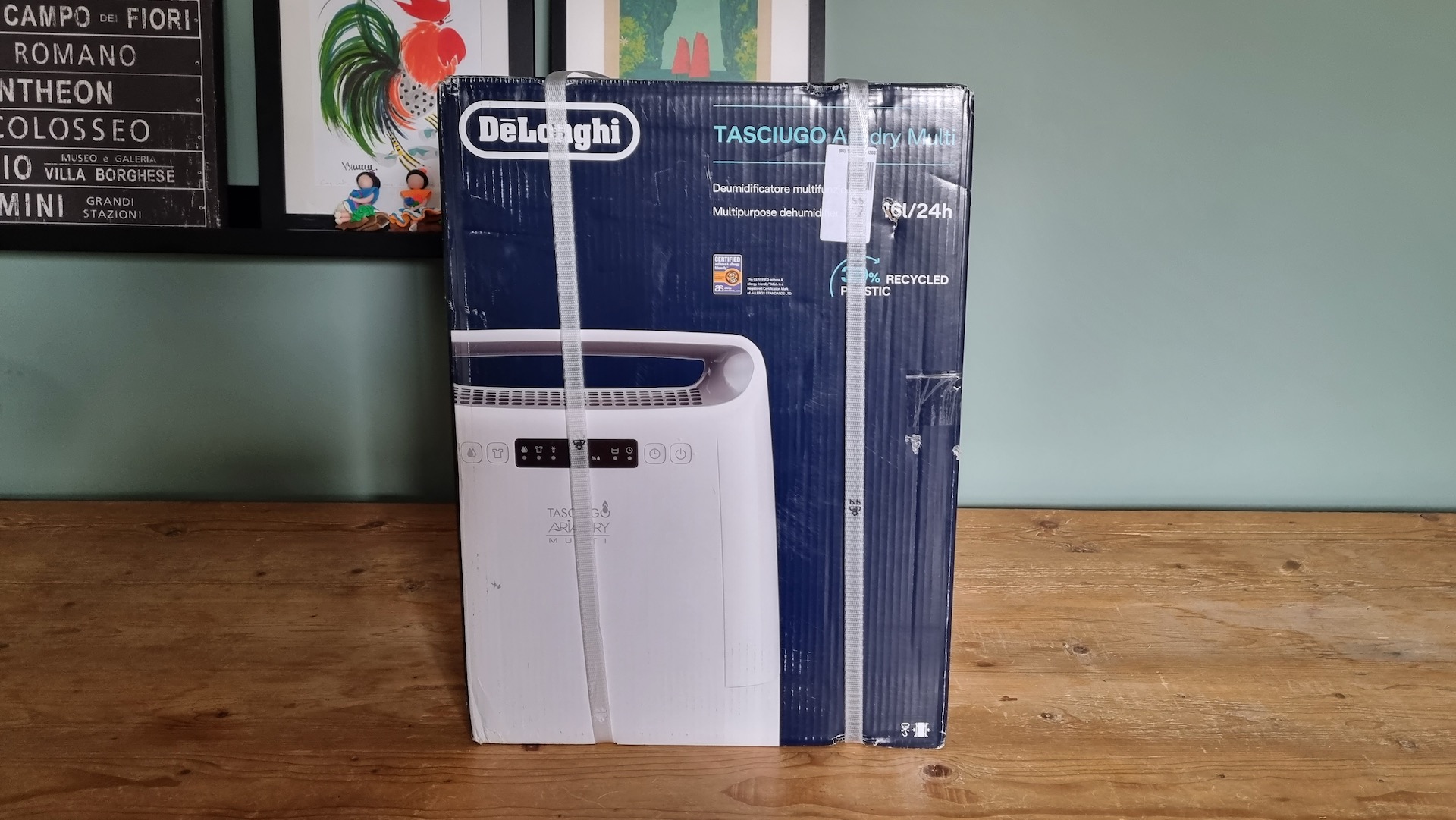
The Tasciugo AriaDry also comes with a set of castors, which you need to attach yourself. This is super simple – they just slide and click into place. I got my mum, who suffers from arthritis and osteoporosis in her hands, to try adding one and she did so without any struggle.
I would expect a model at this higher price point to come with castors, and they made the job of taking the dehumidifier from my dining room/laundry drying room to my living room much easier.
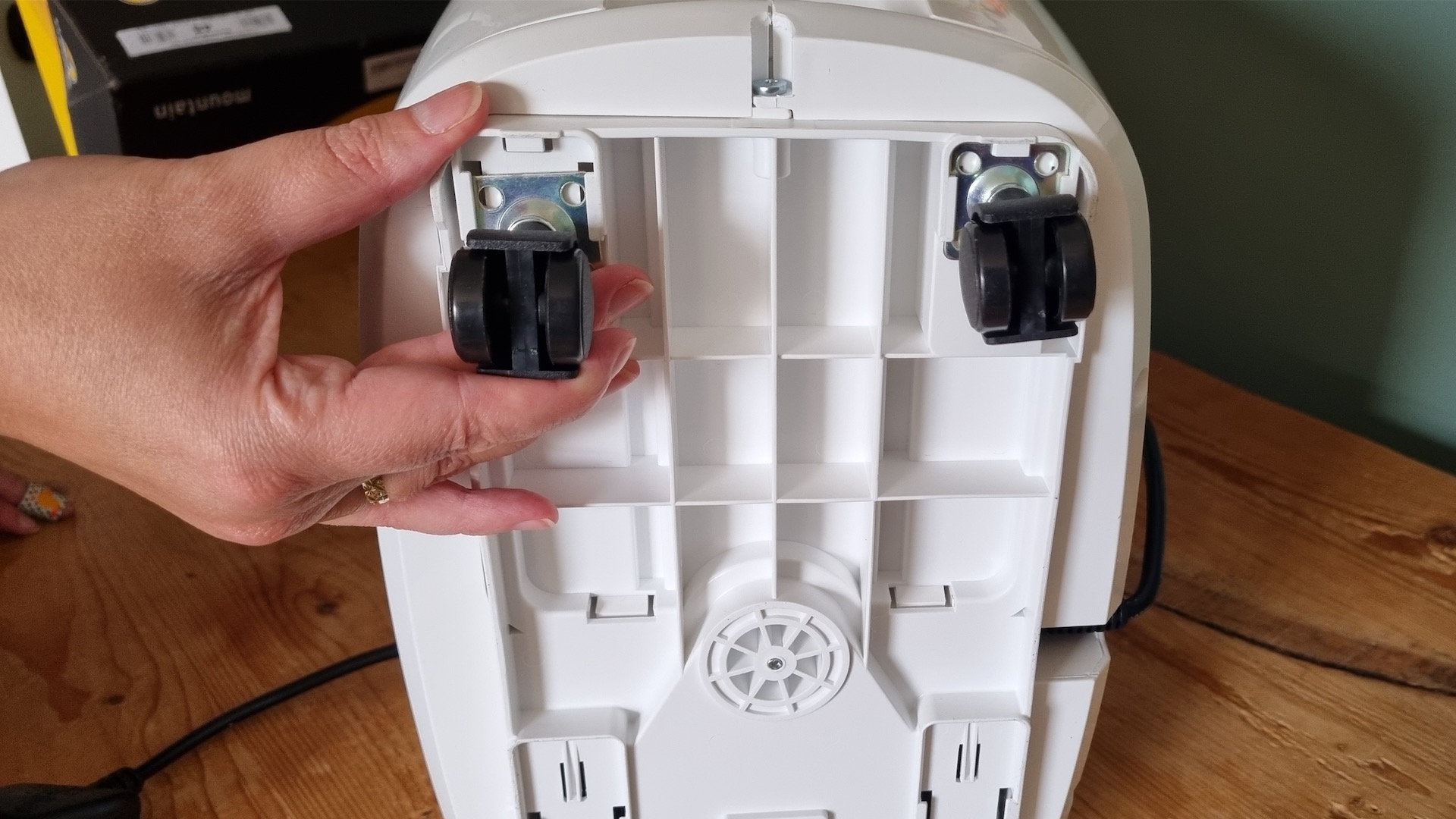
Thanks to that handle, lifting the DeLonghi out of its box was relatively easy when compared to the other dehumdifiers I'd tested. Once you removed the top piece of polystyrene that held it in place, there was plenty of room around the sides to get your hands in and coax it from the polystyrene at the bottom.
Aside from the castors, you'll also find an instruction manual and a continuous drainage hose inside. I didn't test this function as I don't have bad enough humidity issues, but there is a very clear outlet on the appliance that this inserts into, which makes it very easy.
The back panel can also be removed so you can easily dust or vacuum the air filter. Doing so every so often will improve the efficiency of the appliance, so I appreciated that again, this was an easy job. The cover slips back into place with a satisfying click.
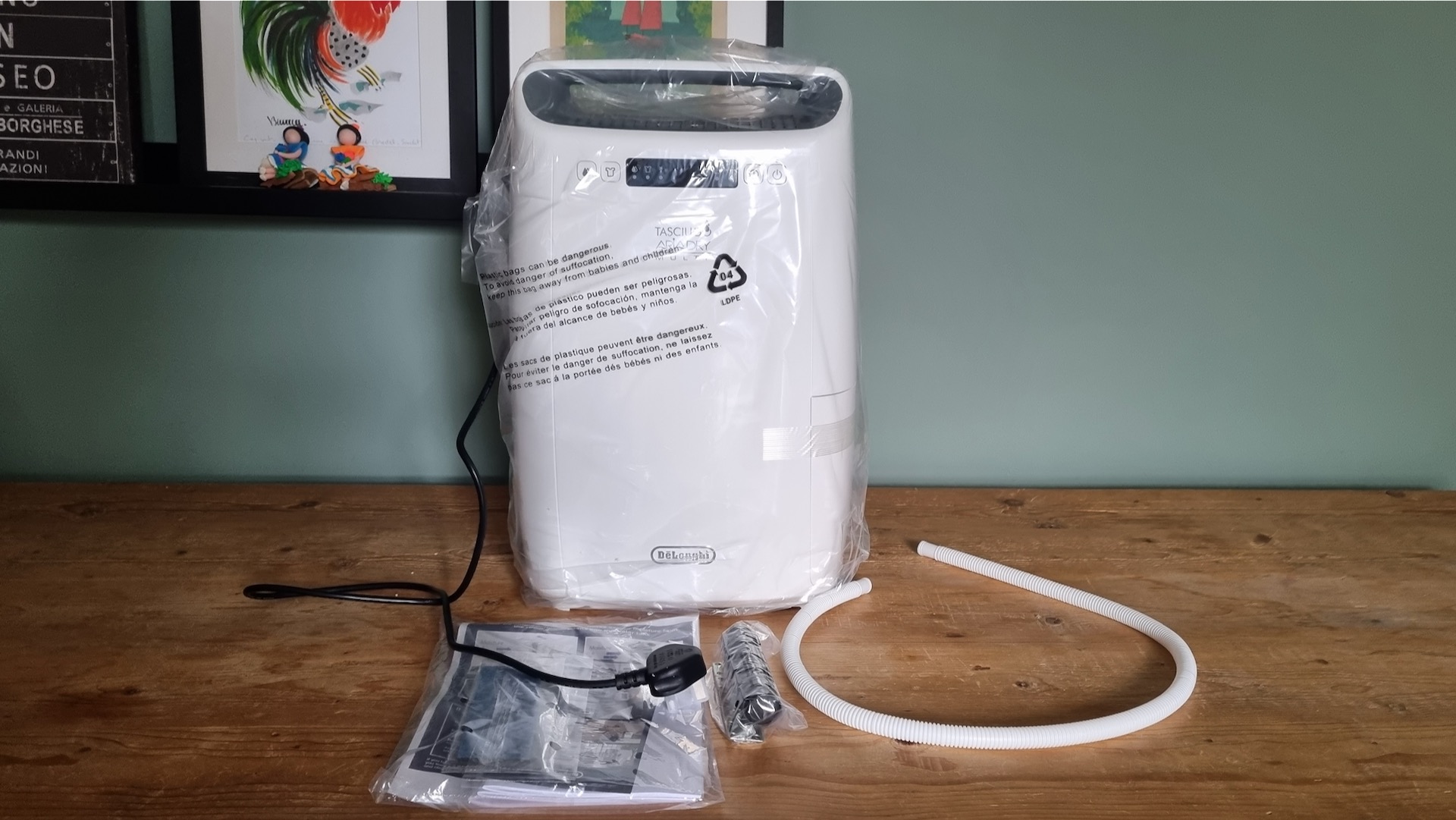
Overall, I had great first impressions of the DeLonghi Tasciugo AriaDry. Though the largest of the models I tested, it was in no way bulky. Its curved edges and handle make it very practical and unobtrusive, with no sharp edges for humans or pets to catch against.
How I tested it
I tested the De'Longhi (DEX216F) alongside two other dehumidifiers – the MeacoDry ABC 12ltr compressor dehumidifier and the EcoAir DC12 Mk3 compressor dehumidifier.
Dehumidifiers have been a big part of my home life for 15 years now – and I've been the long-term owner of two De'Longhi models during that time, as well as a Meaco. One De'Longhi remains in a flat that I rent out, and the other was retired after an impressive 10 years of service. I'm always waxing lyrical about the reasons you should buy a dehumidifier. They really can make a huge difference, particularly if you suffer from a condition such as asthma, or live in a house that seems susceptible to condensation and mould.
This means I had a good idea of performance metrics that I could use as a fair comparison. I gave each unit marks out of five for the following criteria:
- Capacity and water tank: was it big enough; was it easy to remove/replace; was it easy to empty; was it easy to clean, etc.
- Ease of use: How easy was it to turn the dehumidifier on and off; find the right settings; read and operate the control panel; use functions such as timers, etc.
- Design and mobility: was the design attractive; was the dehumidifier supplied with castors; how good was the handle; was it heavy both empty and full of water, etc?
- Noise: was the unit loud?
- Effectiveness at drying washing: To test the capability of this dehumidifier for drying clothes I washed loads of bedding and clothing, weighing it when it was wet out of the machine, then again after a drying time of six hours to see how much water had been removed, also paying attention to the ambient room temperature. I always used the same 'drying room' – my dining room. I did this multiple times using different wash loads of fabrics, including cotton, denim and synthetics.
- Effectiveness of reducing humidity and condensation: I observed how well the dehumidifier was able to reduce mould and condensation in a room over one month.
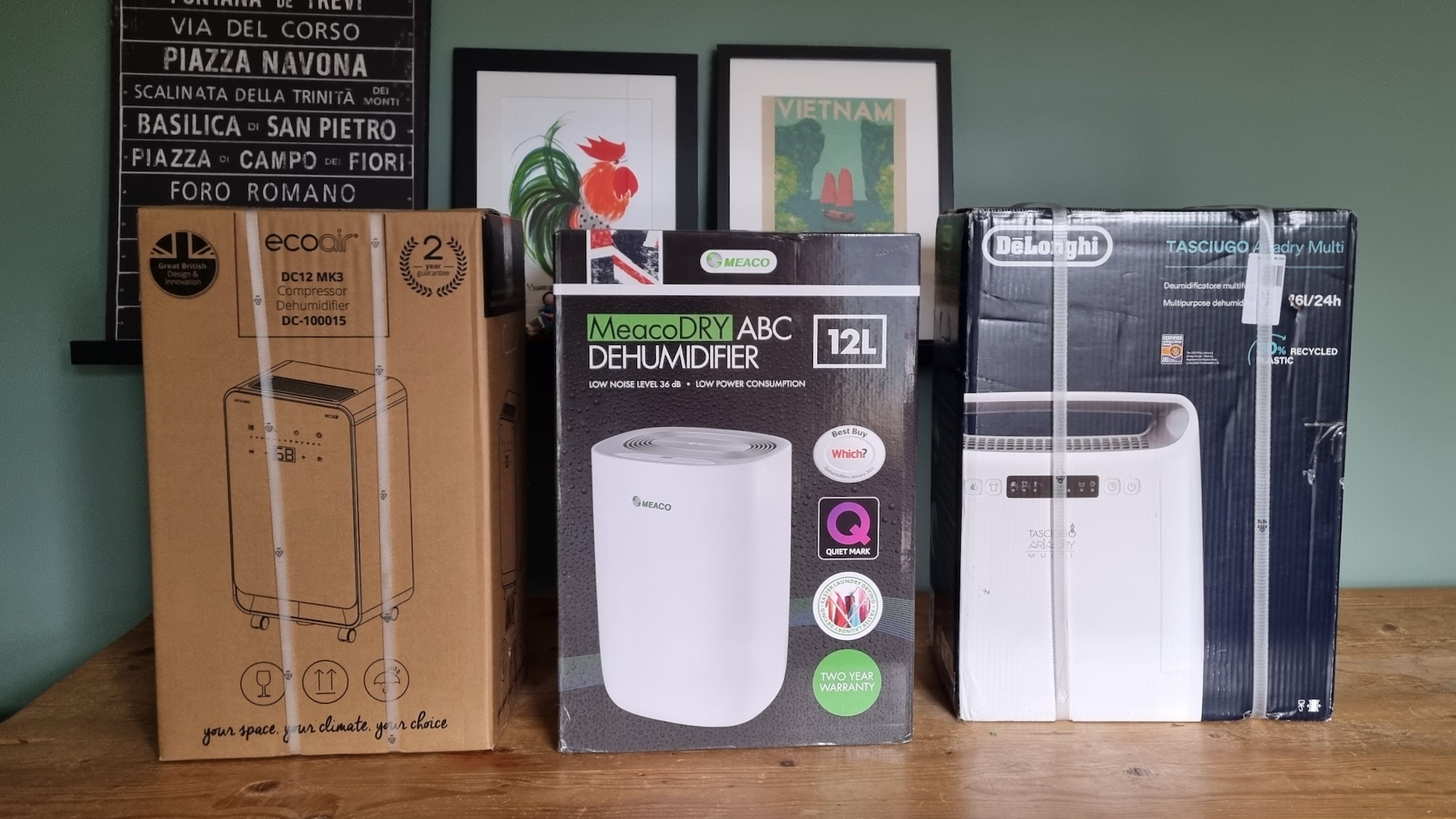
How well does the De'Longhi Tasciugo AriaDry Multi 16L dehumidifier perform?
Capacity and water tank
Unlike the other dehumidifiers I tested, which can remove up to 12ltrs of water from a home in 24 hours, the De'Longhi Tasciugo AriaDry Multi 16L can remove 16 litres. However, while the water tanks of the EcoAir and Meaco were 2 litres and 2.6 litres respectively, I felt the 2.1 litre capacity of this model to be a bit stingy. Especially given how effective this dehumidifier proved to be.
As with the EcoAir, the De'Longhi shuts off automatically when the water tank is full. When I had the appliance running for a full day, I generally found I had to empty it once every 12 hours, or twice a day if I was drying laundry. However, as my home suffers from mid-range humidity issues, I think you'll find yourself emptying it three or more times if humidity is high, or if you're drying more than one load of washing at a time.
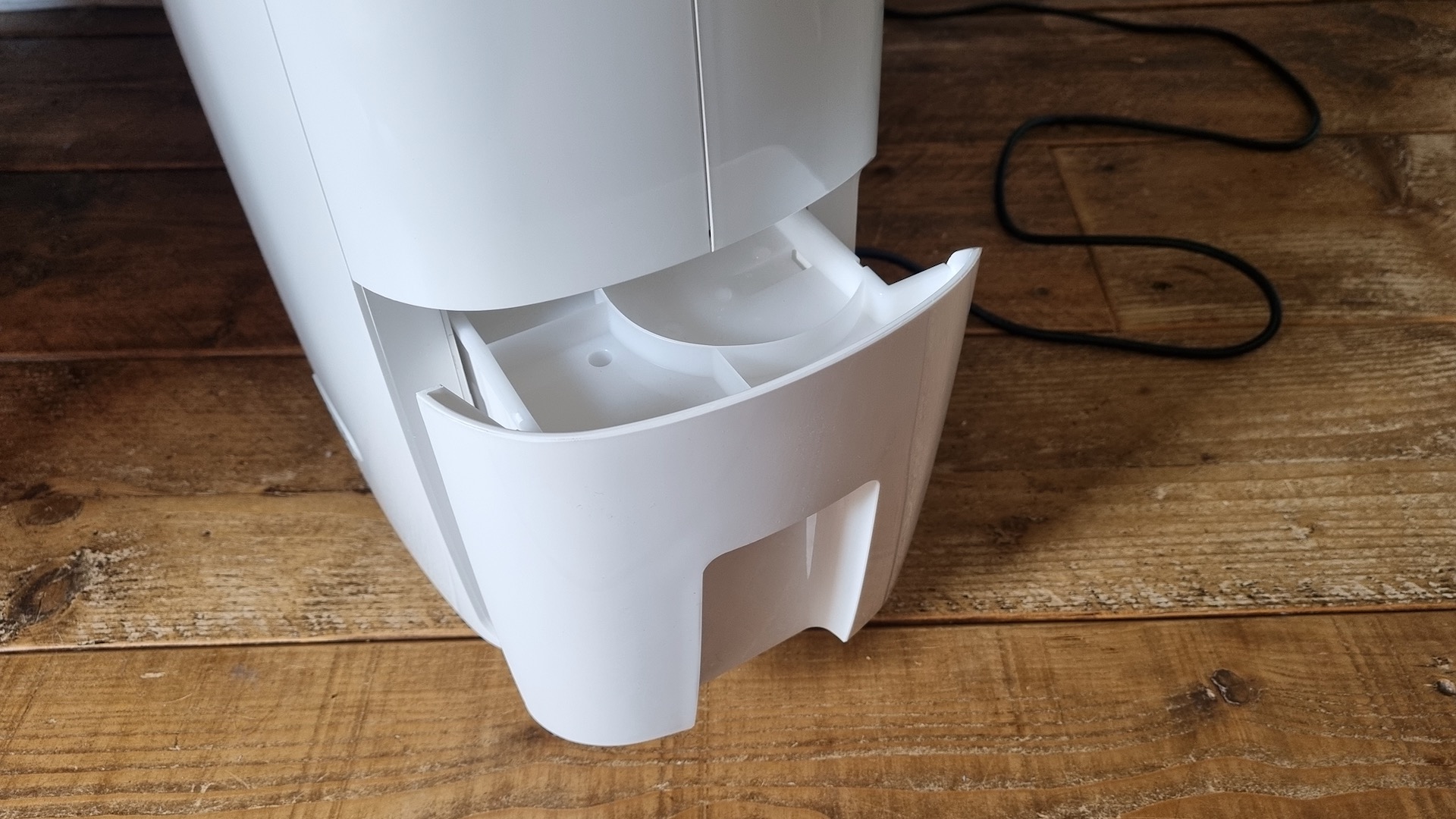
Of the three models I tested together, this was the only example of a water tank that pulled out from the side of the appliance. The first advantage of this is that the shape of the water tank was 'squarer' than other designs that fit across the back of the appliance and tend to be long and thin. This made it more stable to remove and replace and much easier to carry away to empty.
Removing the full tank is also made easier by the fact the tank has a lid. And while I'd read other reviews that said the lid had a tendency to pop off, I had no issues whatsoever. It was easy to remove, or you could keep it place and pour the water out from a 6 x 2cm hole in the top.
WARNING: Never use water from your dehumidifier to water edible plants such as tomatoes, or as drinking water.
Noise
Second only to the smaller EcoAir DC12, the De'Longhi AriaDry Multi 16L is a quiet dehumidifier, and one that I was happy to have running in my carpeted bedroom. There's barely anything in it volume wise, and it took some tech to really differentiate between the two.
Using a sound meter app on my smartphone, I took regular readings from a distance of around 1 meter away at regular intervals. In my carpeted bedroom it measured, on average, 51dB on high fan laundry mode, and 46dB on its lowest fan setting. This compared to 59dB and 50dB, respectively, for the louder Meaco ABC, and 48dB and 44dB for the EcoAir.
As with the EcoAir, we did notice that every so often the De'Longhi would develop a deeper hum for a minute or two, but this would quickly kick out again.
So while I probably wouldn't want to run it in the bedroom in laundry mode at night (!), the low fan was unobtrusive, and both my partner and I slept soundly with it running in the background.
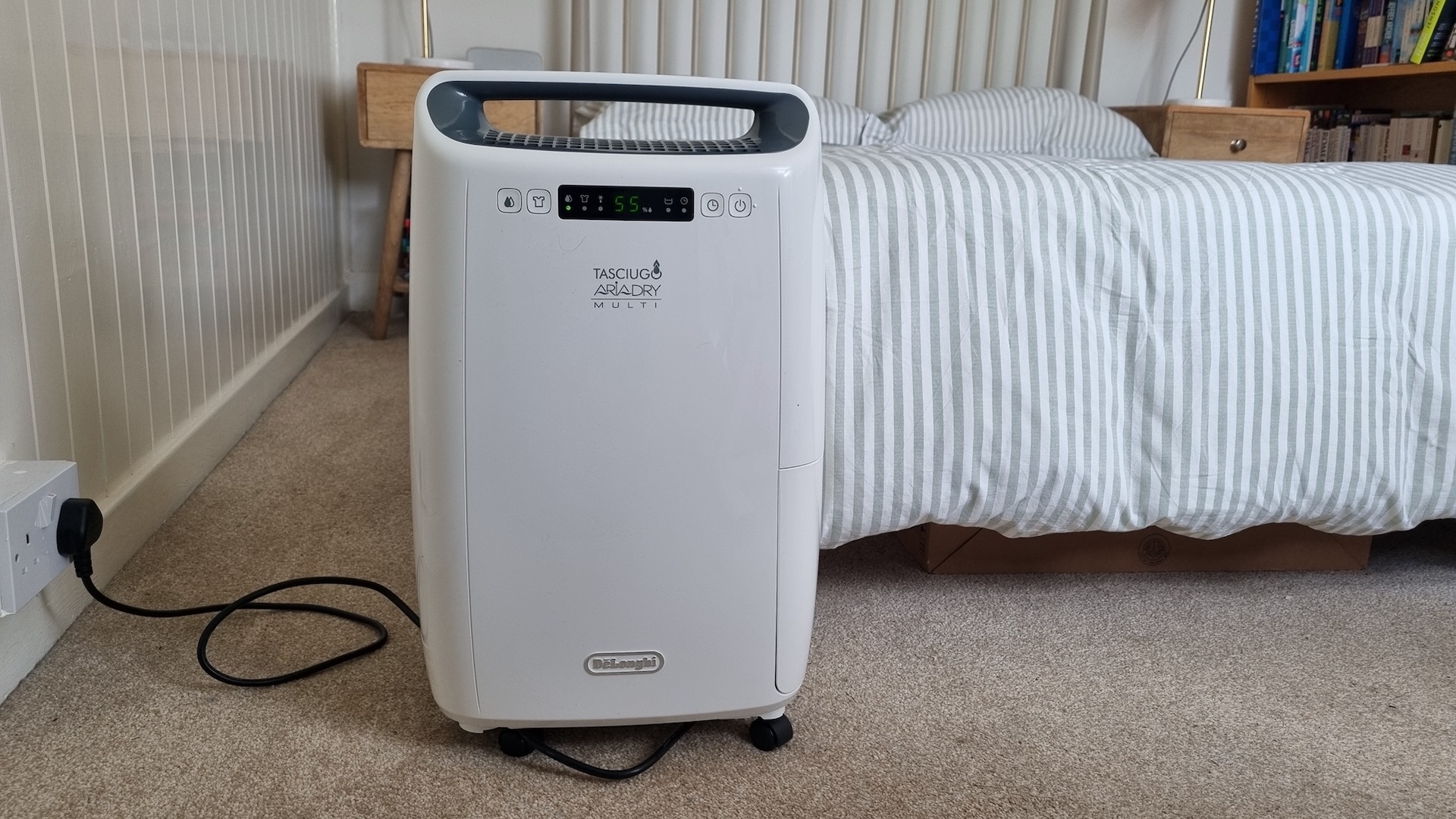
Effectiveness at drying laundry
Next up, a key feature of any dehumidifier – its performance in laundry mode. The first thing to notice about the De'Longhi is that this mode is very easy to activate by pressing the button with the 't-shirt' icon. You'll know you've done it right as the letters dy will appear on the screen.
This will put the appliance into maximum dehumidifying capacity. It will continue to run at this level until you actively turn it off or the water tank is full.
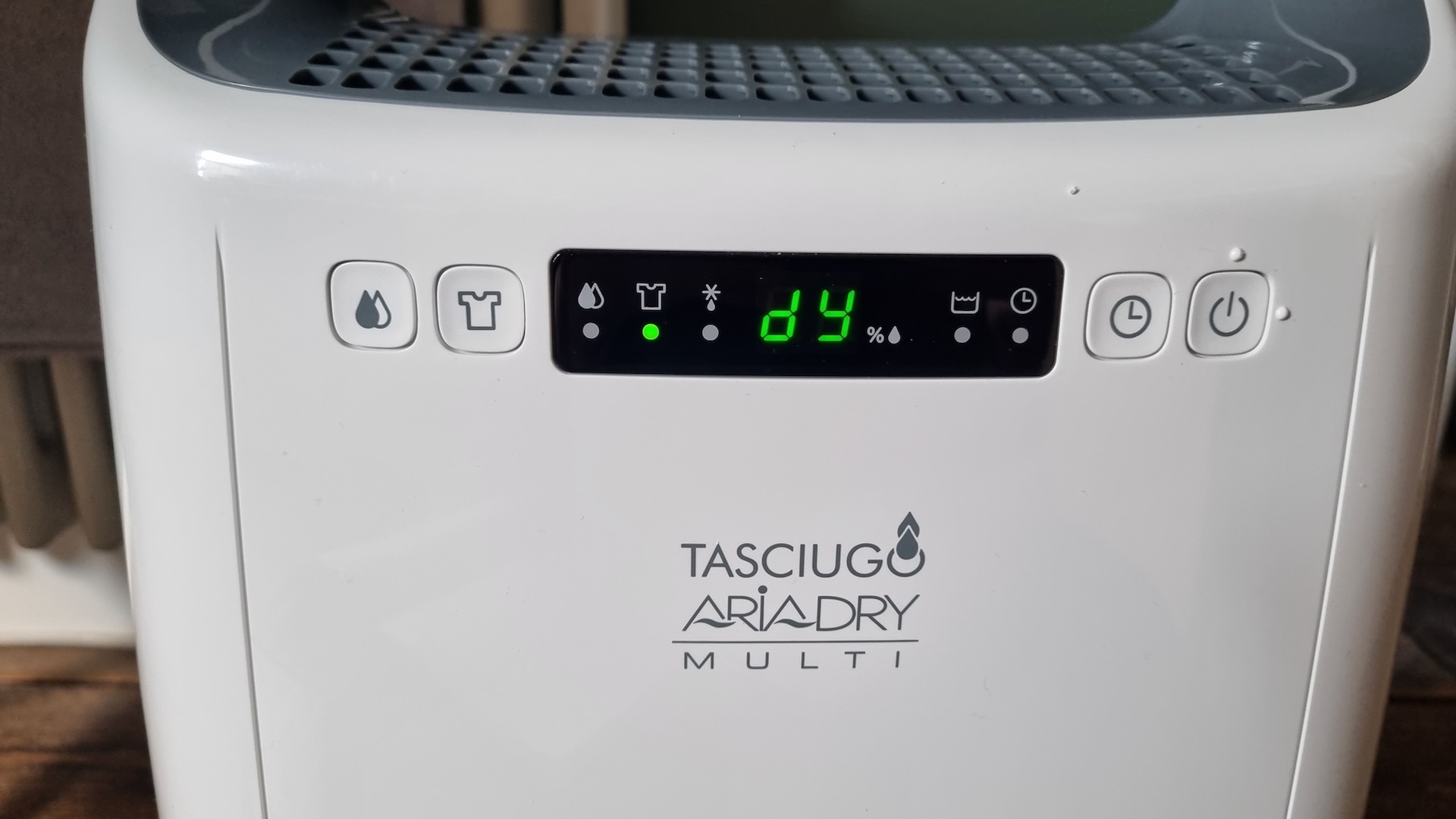
The good news is, there is a delya start and a delay shut-down on the appliance, so if you don't want it guzzling electricity all night, there's something you can do about it.
For delay start, press the clock button in stand-by mode. Then keep pressing the clock between a 1,2,4,6,8 and 12 hour delay. For delay shut-down, you can activate the mode by pressing the clock button while the dehumidifier is operating. In reality, in laundry mode, this is the option I used the most. Your time options are the same, and the function was very reliable in practice.
The performance of the De'Longhi was as good as any dehumidifier I've tried, and certainly on a par, if not better than, the MeacoDry ABC 12ltr. Taking a dry 5kg load of mixed cotton and synthetic clothes as an example, this weighed 6.25kg after washing. After 6 hours in laundry mode, the dehumidifier had collected 1250ml of water. After 8 hours, it had collected 1650ml of water, and most of the synthetics on the clothes horse were bone dry. Some cottons were iron dry, and some were still a little damp, but the weight of the washing had reduced to 5.25kg.
Our (unheated) airers live in the dining room of our home, which measures 13 sq m. In this space, in the centre of the house, it typically takes between 14 and 36 hours for washing to become iron-dry, depending on the fabric, denim generally taking longest. So for synthetics to be dry in 6 hours and jeans in less than a day is a marked improvement.
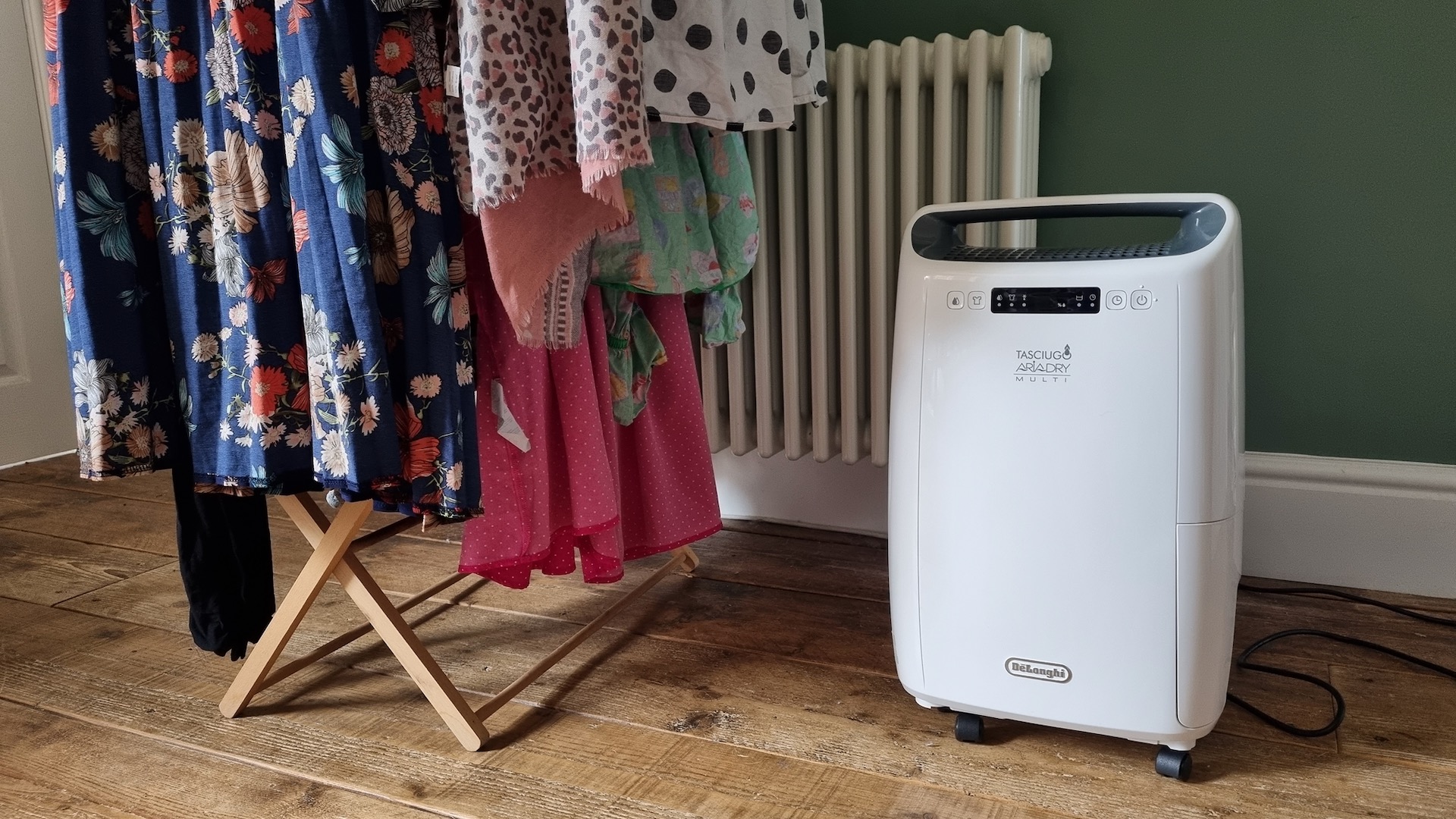
Effectiveness of removing humidity and condensation
Because the De'Longhi is more powerful than the other machines I'd tested, I decided to put it work in the dampest rooms of our home on the ground floor. I found it to be both quieter and less intrusive noise wise than the MeacoDry ABC, emitting a lower hum and importantly, recirculating warmer air. The Meaco made our living room quite draughty, especially in winter, whereas the De'Longhi pumped out warm air, keeping us toasty.
The AriaDry also comes with a small blue air filter that De'Longhi states can 'noticeably reduce' the concentration of allergens in the air, such as pollen, animal dander, dust mites and mould. I wasn't sure how noticeable this would be in practice, but I'd say the air did have a fresh feel and smelt 'cleaner' somehow. As I have an open fire in the room, on the rare times I lit it, putting the dehumidifier on immediately after quickly cleared any smoky smell.
In terms of reducing humidity and condensation in the living room, the De'Longhi was exceptional. Within a few days, the room had dropped from around 68% to 48%, and this was maintained consistently over six weeks. There was barely any condensation over the winter, and I took to wheeling it to my downstairs bathroom after showering in the morning, where it would clear any moisture in 30 minutes.
It's possibly to programme the De'Longhi AriaDry to maintain a relative humidity by pressing the button with two drops of water on it. The seven levels available are 30%, 40%, 45%, 50%, 55%, 60% and 70%. When the machine reaches the preset humidity, the appliance will stop humidifying and operate at a low ventilation speed.
You don't have quite as many humidity setting options as, say, the MeacoDry ABC, but I didn't feel I needed anything more precise, and generally selected the 45% or 50% options. For what I needed it to do, The De'Longhi was up there with the best.
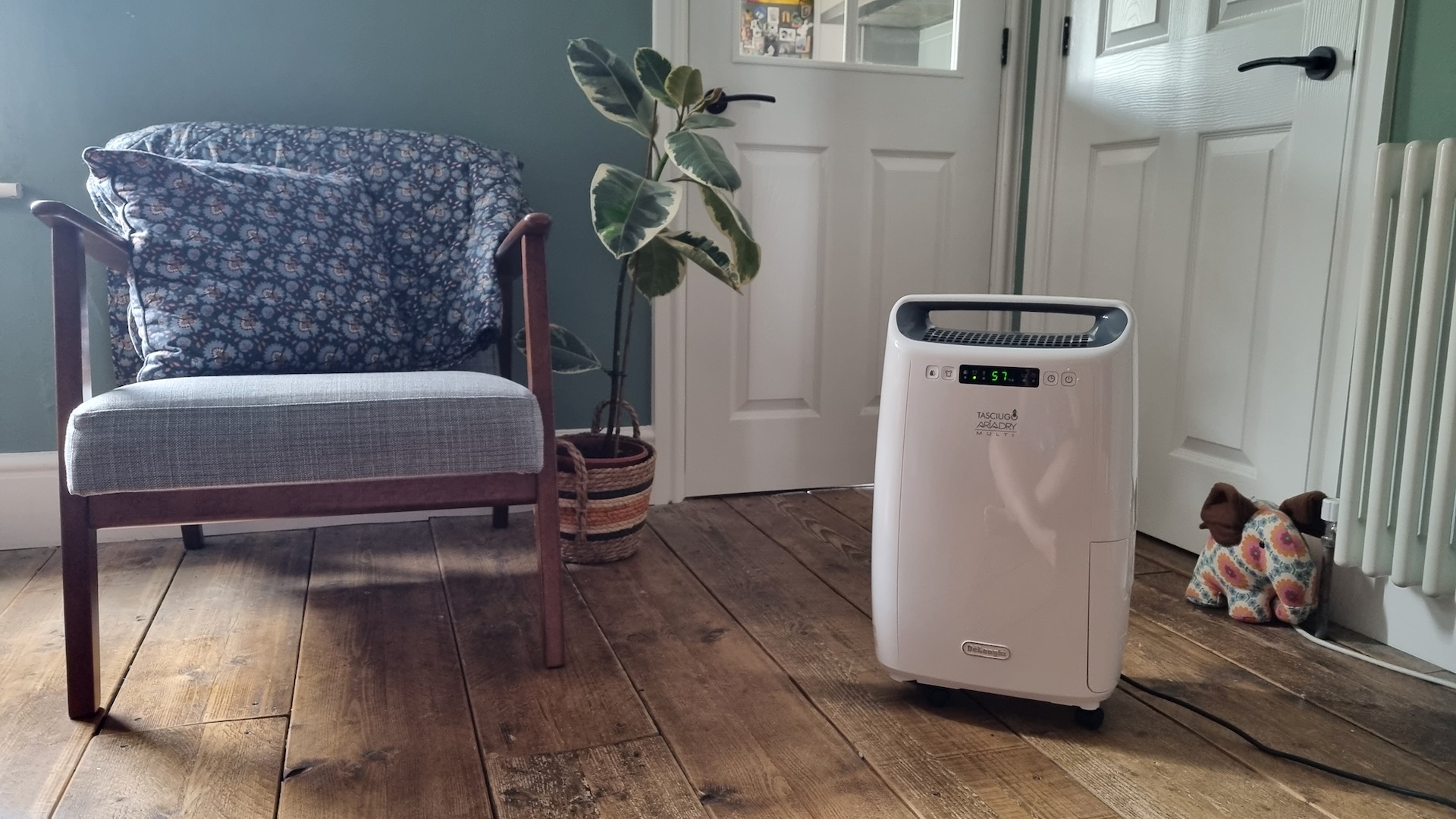
Power consumption
The De'Longhi AriaDry has a power consumption level of 290W. This compares to 216W for the best-in-class MeacoDry Arete with a higher 20ltr extraction rate, and 155W for the Meaco ABC 12ltr model I tested. That means it costs more to run. But how much more?
To establish their running costs, take the wattage of the appliance and divide by 1000 to get its kWh usage. Then take what you pay for energy per pence/kWh, and use the following calculation: kWh rate x electricity cost per kWh x number of hours the appliance is running.
For our calculations, we'll use the the Government's January 2024 energy price cap of 29p per kWh. But you can look at your own bills to see what you're paying per kWh.
With this in mind, the maximum you'd pay to run each of the three dehumidifiers I tested would be:
- EcoAir DC12 Mk3: 0.210kWh x £0.29 x 6hrs = £0.37
- Meaco ABC 12ltr: 0.151 x £0.29 x 6hrs = £0.26
- DeLonghi Tasciugo AriaDry Multi 16L: 0.290 x £0.29 x 6hrs = £0.50
On that basis, the De'Longhi does use more energy than other models in this category, albeit at a higher extraction rate. And it's more expensive to run than the MeacoDry Arete 20ltr model, which costs 0.216kWh x £0.29 x 6 = £0.38.
Who is the De'Longhi Tasciugo AriaDry Multi 16L right for?
Chris Michael, managing director of dehumidifier manufacturer Meaco, always explains that choosing the right extraction level for a dehumidifier is always tricky.
"There are so many factors to take into account," he says. "But it's worth remembering that people create moisture – by bathing, showering, cooking, boiling the kettle, drying laundry and even breathing – and not houses. So, the more people in a space, the fewer extractor fans in the kitchen and bathroom and the more washing being dried indoors, the larger the machine should be."
De'Longhi states that the AriaDry Multi 16L is suitable for rooms (or more likely, single floors) of up to 75 square metres. I'd say it's a good size for three-to-four bed homes with light condensation/mould and around 60% humidity, or a two-bedroom home with musty smells, medium to bad condensation and mould, and 70% or more humidity.
It's a great machine for drying laundry, and it's also relatively quite, so if you're looking for a dehumidifier to sit in a bedroom, it is suitable in my view. Thanks to its anti-allergen filter, I'd also specifically recommend this model for people that suffer from allergies
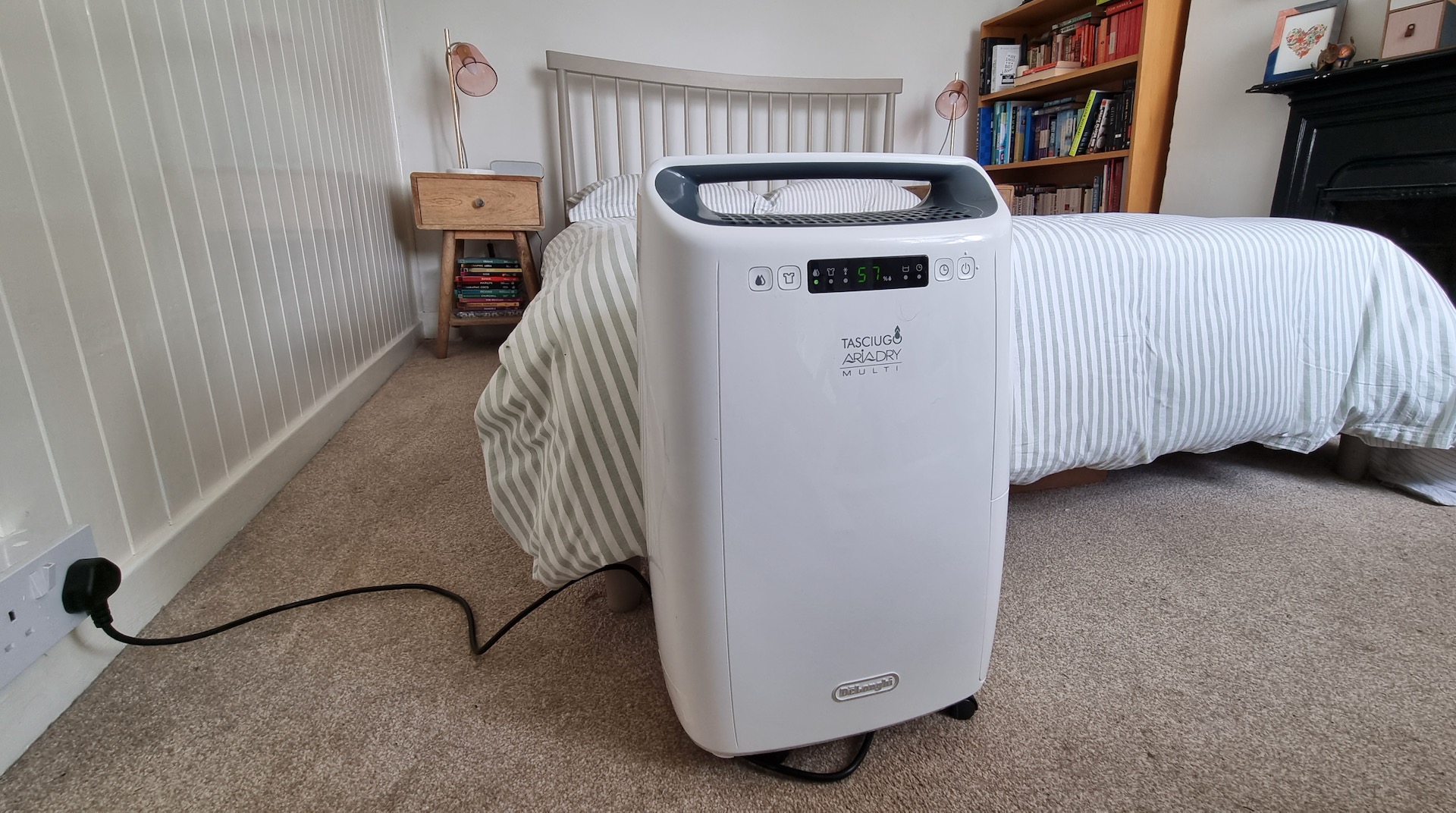
Should you buy the De'Longhi Tasciugo AriaDry Multi 16L?
You should never buy an appliance unless you really need it and can afford it. So before you invest, I recommend you check out what I wish I'd known before I bought a dehumidifier and decide if you really need one.
On balance, I'd say yes to spending your hard earned cash on the De'Longhi Tasciugo AriaDry Multi 16L, for several reasons. But I also have one caveat, and that is to buy it for less than the RRP of £349.99, which I think is too high. Thankfully there are plenty of deals out there, and this model can often be picked up for around the £280 mark, and can even be discounted as low as £250.
So why do I rate it? For one, it is the best I've tried at drying laundry quickly. To have synthetics like fleeces dry in a matter of hours in winter and for jeans to be dry in under 24 hours is just darn impressive. In my view, there's no model that performs better at the job.
The next huge plus is the design. I'm a big fan of its substantial carry handle that makes it easy to bring up and down stairs. The included castors, also mean you can wheel it around an open-plan layout with ease to target different areas – and to hide away when you don't need it.
Not that the design is something you'd want to hide. Its curves make this dehumidifier easier on the eye than most. Then there's the control panel, which does exactly what you need it to, without overcomplicating things. It displays the room's humidity very clearly whatever the time of day – unlike the EcoAir that I tested, which was hard to decipher in certain lights. It has well-signposted buttons for on and off, setting a timer, drying clothes, and regular dehumidifying, where you cycle through to set the level. If you're a bit of a technophobe, you'll love this model. My mum was a huge fan.
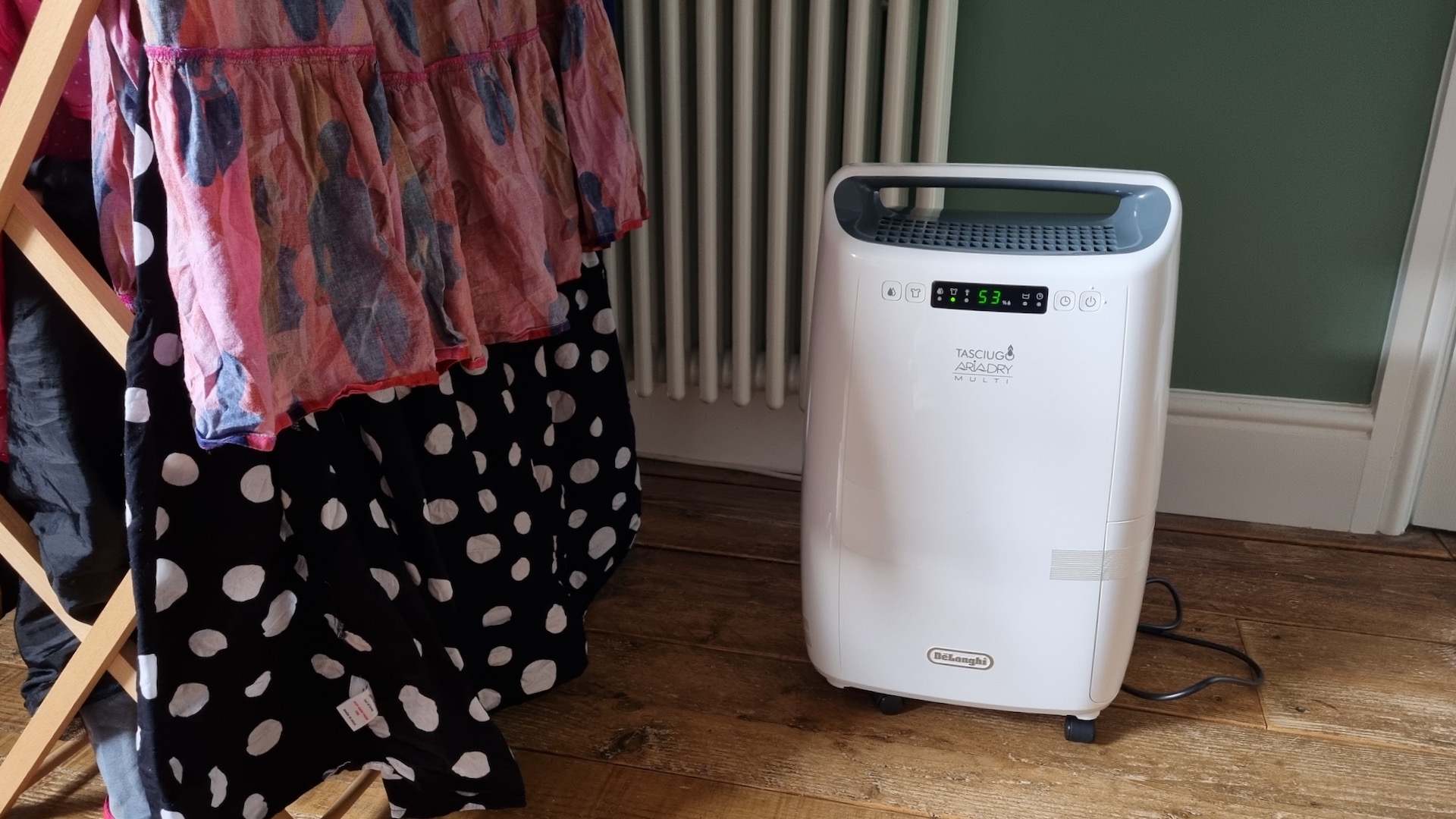
The water tank is another great feature for me – it's neat, quick to remove and easy to empty without any spills. It's just a shame it's not a little bit bigger to correspond to the machine's extraction rate.
This model is also quiet at night. It doesn't quite pip the quietest I tested, the EcoAir, but it's as close as makes little difference. There's no night mode, which would shut off the display, but this is smaller and less obtrusive than a bedside clock – or your phone – so it's again no biggie.
So are there any downsides? Asides from the steep RRP and the water tank capacity, I would say the running cost is quite high. But as it's so good at its job, you'll find yourself running it less often or for shorter bursts of time, so it's not a deal breaker for me. You might also prefer a more exacting range of humidity settings, but again, I was content with the options given.
DeLonghi Tasciugo AriaDry Multi 16L compressor dehumidifier | was £350, now £250, Argos
In a very smart navy blue, this is one dehumidifier you won't mind keeping on show. It can remove 16 litres of water from the air in 24 hours, which means it's perfect for medium-sized family homes with three to four bedrooms. With £100 off the RRP, it's well worthy of your investment.
Sign up to our free daily email for the latest royal and entertainment news, interesting opinion, expert advice on styling and beauty trends, and no-nonsense guides to the health and wellness questions you want answered.

Amy is a PPA award-winning Digital Editor who has been working in the wonderful world of interiors for over 16 years. She has worked on titles including Inside Readers’ Homes, Inspirations for Your Home, Country House & Home and 25 Beautiful Kitchens magazine. After a stint on Beautiful Homes, she joined Ideal Home in 2010 as a Consumer Editor, then Technology Editor where she was better known as 'Girl About Tech' to prove her credentials as a product expert before landing the role of Digital Editor of Ideal Home in 2017.
Amy now works freelance across leading world-renowned Homes & interior titles such as Homes & Gardens, Real Homes and Ideal Home.
